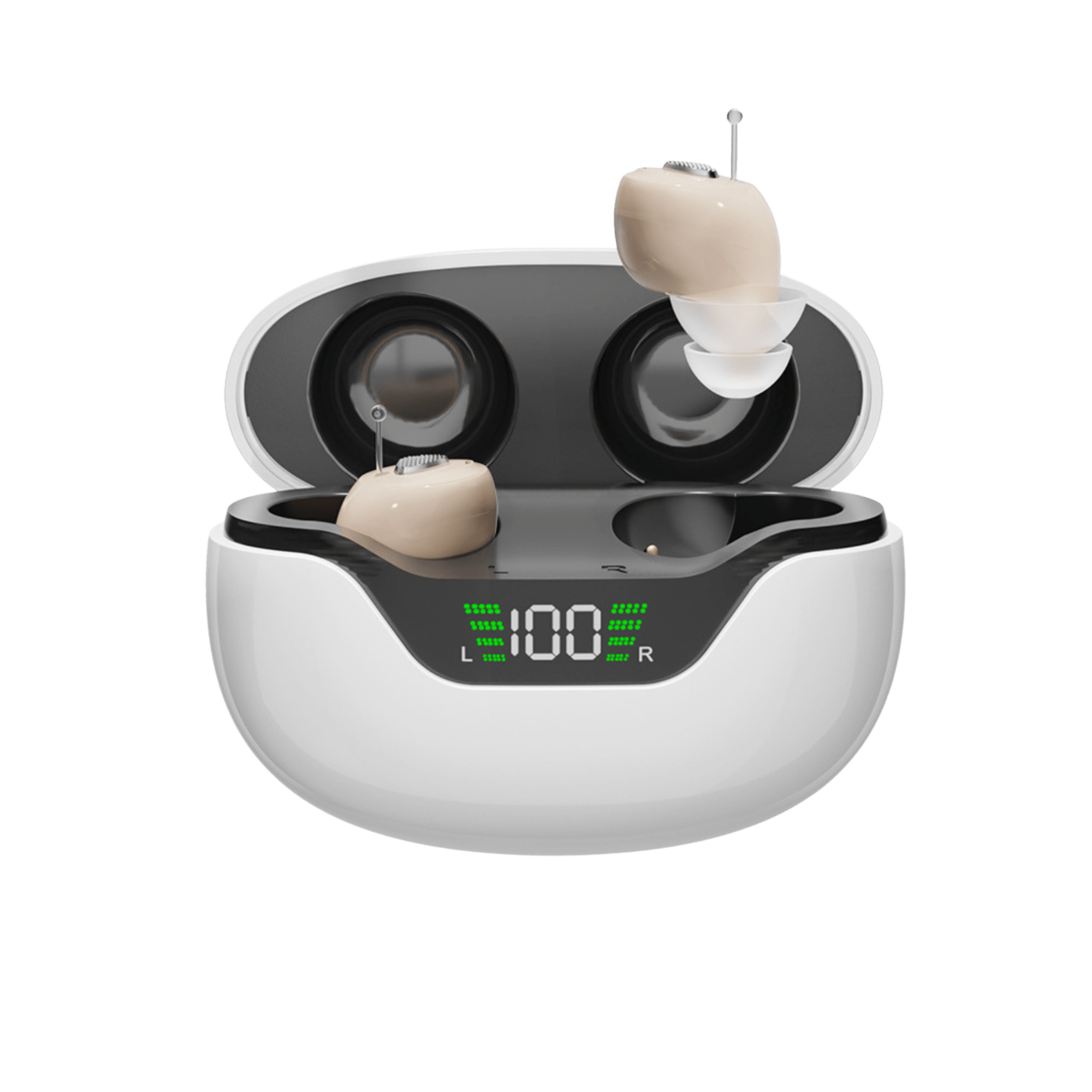Hearing aids have a number of advantages, including the reduction of listening strain, the prevention of hearing loss, and the improvement of one's ability to participate in social activities.
Hearing loss can express itself as an unpleasant impediment in everyday life, making communication difficult and contributing to social isolation as a result. Hearing aids, fortunately, provide a workable answer, as they promise not only to ease strain during discussions in various surroundings but also to prevent further hearing loss and permit more active involvement in social settings.
Let's go deeper into these fascinating possibilities and throw some light on the ways in which hearing aids have the potential to improve not just your auditory experience but also your overall quality of life.
Lessening the Effects of Stress in a Variety of Listening Environments
Listening in distinct situations typically includes various problems. For instance, the bustling environment of a packed café or the noise caused by wind in an outdoor setting is very unlike to a conversation that is taking place in a peaceful setting at home. Hearing impaired people sometimes experience auditory overload or strain, particularly in busy surroundings, which makes it challenging for them to differentiate speech from background noise.
Enter hearing aids, the cutting-edge technology developed to help alleviate the symptoms of this condition. These gadgets are equipped with microphones that can take up sound, enhance it, and then transmit it straight into your ear. However, they are not only amplifiers; rather, they are highly developed minicomputers that are designed to highlight the sounds that you want to hear, such as speech, while minimizing the noises that you do not want to hear, such as background noise.
Hearing aids of today employ digital signal processing to do real-time assessments of the surrounding sound environment and make adjustments to the sound output accordingly. Because of this dynamic function, the user will have less strain when listening, which will make discussions clearer and more pleasurable in a range of settings.
Limiting the Progression of Further Hearing Loss
It is crucial to address this problem with an evidence-based perspective, despite the fact that there is a common notion that hearing aids could prevent future degradation of hearing. To the best of my knowledge, there are no conclusive scientific studies that have proven that hearing aids prevent the development of hearing loss. Hearing loss is often caused by irreparable damage to the cells in the inner ear or complications connected to the nerves in the inner ear.
Hearing aids, on the other hand, have been shown to indirectly improve auditory health, which is an important fact to keep in mind. By supplying the brain with the appropriate auditory input and so preventing hearing deprivation, they contribute to the preservation of the brain's capacity for the processing of auditory information. Hearing loss can cause your brain to 'forget' how to interpret sound signals, which can lead to cognitive deterioration over time. This can happen when the brain gets less sound impulses than it used to.
Therefore, even while hearing aids might not immediately prevent additional hearing loss, they do play a crucial role in preserving your present level of auditory functioning and supporting your general cognitive health.
Facilitating Participation in Active Social Activities
Effective communication is the foundation of all of our relationships, which is fitting given that humans are by nature social organisms. Participating in social activities can be nerve-wracking and draining for those who have hearing loss. As a result, these individuals frequently retreat from social interaction and report feelings of loneliness.
By allowing for improved communication, the adoption of hearing aids has the potential to drastically improve the current state of affairs. Hearing aids make it possible for their wearers to participate more confidently in discussions by improving the clarity of speech and lowering the strain of listening. They are able to more readily follow group talks, better comprehend the context of the conversation, and respond properly, all of which contribute to more meaningful social connections.
Additionally, many hearing aids now come equipped with connectivity technologies such as Bluetooth, which enables users to stream phone calls, music, and TV shows straight to their hearing aids. This capability is now standard on many hearing aids. These characteristics make communication and entertainment more accessible and pleasurable, which in turn encourages increased social contact.
Hearing aids are a game-changing option for people who are coping with hearing loss, as the conclusion of this paragraph suggests. They are highly effective in reducing listening strain in a wide variety of contexts, contribute to the preservation of both auditory and cognitive health, and encourage active involvement in social activities. If you have been experiencing hearing loss, it is possible that it is time for you to investigate the options that hearing aids provide. Always keep in mind the need of seeking the advice of a hearing healthcare specialist in order to locate the option that best meets your individual requirements.
Hearing loss can express itself as an unpleasant impediment in everyday life, making communication difficult and contributing to social isolation as a result. Hearing aids, fortunately, provide a workable answer, as they promise not only to ease strain during discussions in various surroundings but also to prevent further hearing loss and permit more active involvement in social settings.
Let's go deeper into these fascinating possibilities and throw some light on the ways in which hearing aids have the potential to improve not just your auditory experience but also your overall quality of life.
Lessening the Effects of Stress in a Variety of Listening Environments
Listening in distinct situations typically includes various problems. For instance, the bustling environment of a packed café or the noise caused by wind in an outdoor setting is very unlike to a conversation that is taking place in a peaceful setting at home. Hearing impaired people sometimes experience auditory overload or strain, particularly in busy surroundings, which makes it challenging for them to differentiate speech from background noise.
Enter hearing aids, the cutting-edge technology developed to help alleviate the symptoms of this condition. These gadgets are equipped with microphones that can take up sound, enhance it, and then transmit it straight into your ear. However, they are not only amplifiers; rather, they are highly developed minicomputers that are designed to highlight the sounds that you want to hear, such as speech, while minimizing the noises that you do not want to hear, such as background noise.
Hearing aids of today employ digital signal processing to do real-time assessments of the surrounding sound environment and make adjustments to the sound output accordingly. Because of this dynamic function, the user will have less strain when listening, which will make discussions clearer and more pleasurable in a range of settings.
Limiting the Progression of Further Hearing Loss
It is crucial to address this problem with an evidence-based perspective, despite the fact that there is a common notion that hearing aids could prevent future degradation of hearing. To the best of my knowledge, there are no conclusive scientific studies that have proven that hearing aids prevent the development of hearing loss. Hearing loss is often caused by irreparable damage to the cells in the inner ear or complications connected to the nerves in the inner ear.
Hearing aids, on the other hand, have been shown to indirectly improve auditory health, which is an important fact to keep in mind. By supplying the brain with the appropriate auditory input and so preventing hearing deprivation, they contribute to the preservation of the brain's capacity for the processing of auditory information. Hearing loss can cause your brain to 'forget' how to interpret sound signals, which can lead to cognitive deterioration over time. This can happen when the brain gets less sound impulses than it used to.
Therefore, even while hearing aids might not immediately prevent additional hearing loss, they do play a crucial role in preserving your present level of auditory functioning and supporting your general cognitive health.
Facilitating Participation in Active Social Activities
Effective communication is the foundation of all of our relationships, which is fitting given that humans are by nature social organisms. Participating in social activities can be nerve-wracking and draining for those who have hearing loss. As a result, these individuals frequently retreat from social interaction and report feelings of loneliness.
By allowing for improved communication, the adoption of hearing aids has the potential to drastically improve the current state of affairs. Hearing aids make it possible for their wearers to participate more confidently in discussions by improving the clarity of speech and lowering the strain of listening. They are able to more readily follow group talks, better comprehend the context of the conversation, and respond properly, all of which contribute to more meaningful social connections.
Additionally, many hearing aids now come equipped with connectivity technologies such as Bluetooth, which enables users to stream phone calls, music, and TV shows straight to their hearing aids. This capability is now standard on many hearing aids. These characteristics make communication and entertainment more accessible and pleasurable, which in turn encourages increased social contact.
Hearing aids are a game-changing option for people who are coping with hearing loss, as the conclusion of this paragraph suggests. They are highly effective in reducing listening strain in a wide variety of contexts, contribute to the preservation of both auditory and cognitive health, and encourage active involvement in social activities. If you have been experiencing hearing loss, it is possible that it is time for you to investigate the options that hearing aids provide. Always keep in mind the need of seeking the advice of a hearing healthcare specialist in order to locate the option that best meets your individual requirements.





